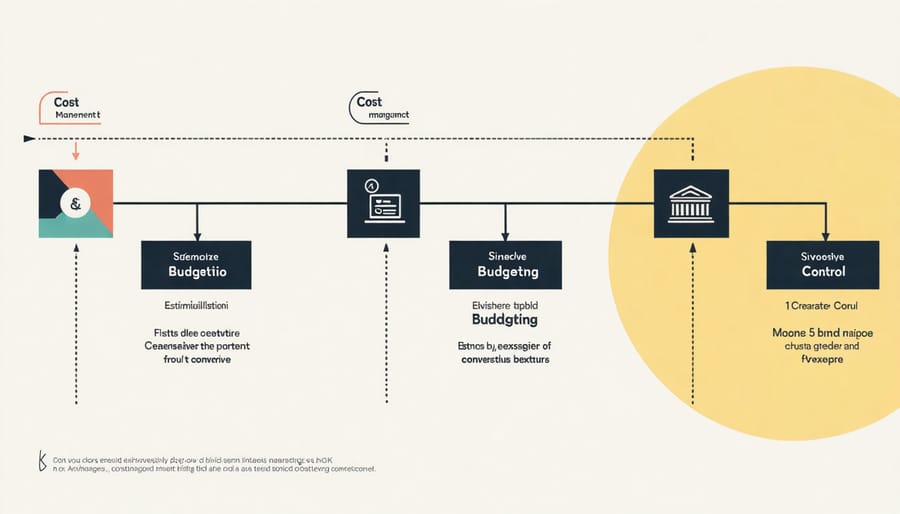To effectively manage costs in projects, construction professionals must master key strategies:
- Establish a comprehensive cost baseline, meticulously capturing all anticipated expenses from labor and materials to overhead and contingencies. This foundation enables precise tracking and control throughout the project lifecycle.
- Implement rigorous cost tracking systems, leveraging advanced software to monitor actual spending against budgeted amounts in real-time. Regular variance analyses identify deviations early, allowing swift corrective actions to keep the project on budget.
- Foster a culture of cost consciousness among the project team, empowering every member to actively seek cost savings without compromising quality or safety. Encourage innovative thinking, value engineering, and continuous improvement to drive financial efficiency.
- Collaborate closely with stakeholders, from clients and designers to suppliers and subcontractors, to align cost expectations, negotiate favorable terms, and make informed trade-offs when necessary. Open communication and shared ownership of cost management goals are essential for success.
By mastering these critical aspects of cost management, construction professionals can deliver projects that meet financial objectives while exceeding client expectations.
Understanding Cost Management
Cost Estimation
Cost estimation is a crucial aspect of project cost management, involving the process of forecasting the financial resources required to complete a project. Project managers must carefully consider various factors, such as labor, materials, equipment, and overhead expenses, to develop accurate cost estimates. They may employ techniques like bottom-up estimating, analogous estimating, or parametric modeling to arrive at these figures. The significance of cost estimation lies in its ability to provide a baseline for budget planning, resource allocation, and performance monitoring throughout the project lifecycle. Accurate cost estimates enable stakeholders to make informed decisions, prioritize objectives, and mitigate potential financial risks. By investing time and effort into precise cost estimation, project managers can establish a solid foundation for successful project execution and deliver value to their organizations.

Cost Budgeting
Cost budgeting is a crucial aspect of project cost management, involving the development and management of project budgets. To create a budget, project managers start by identifying all necessary resources, including labor, materials, equipment, and overhead costs. They then estimate the costs associated with each resource based on historical data, vendor quotes, and industry benchmarks.
Once the initial budget is established, project managers continuously monitor and control costs throughout the project lifecycle. They track actual expenses against the budget, identify variances, and take corrective actions to keep the project within financial constraints. Regular budget reviews and forecasting help project managers anticipate potential issues and make informed decisions.
Effective cost budgeting requires close collaboration with stakeholders, such as the project team, sponsors, and finance department. Transparent communication and timely reporting ensure that all parties are aware of the project’s financial status and can contribute to cost optimization efforts.
Cost Control
Cost control techniques are essential for effectively monitoring and managing project expenses. One crucial aspect is establishing a comprehensive budget baseline that includes all anticipated costs. Regular budget reviews and variance analyses help identify discrepancies between planned and actual expenditures, enabling timely corrective actions. Earned Value Management (EVM) is a powerful tool that integrates scope, schedule, and cost data to provide a holistic view of project performance. By calculating metrics such as Schedule Performance Index (SPI) and Cost Performance Index (CPI), project managers can assess progress and make informed decisions. Leveraging advanced technologies, such as digital twins, can further enhance cost control by simulating various scenarios and optimizing resource allocation. Additionally, implementing change management processes ensures that any scope changes are properly evaluated, approved, and incorporated into the budget. By proactively monitoring costs, project managers can identify potential overruns early, implement corrective measures, and keep the project financially on track.
Benefits of Effective Cost Management
Improved Project Profitability
Effective cost management is essential for maximizing project profitability in the construction industry. By accurately estimating, tracking, and controlling costs throughout the project lifecycle, construction professionals can ensure that their projects remain within budget and generate the desired profit margins. Implementing robust cost management practices helps identify potential cost overruns early on, allowing for timely corrective actions. Moreover, by continuously monitoring and analyzing project costs, project managers can make informed decisions about resource allocation, procurement strategies, and value engineering opportunities. This proactive approach to cost management not only minimizes financial risks but also enables construction companies to optimize their profitability and maintain a competitive edge in the market.
Enhanced Resource Allocation
Effective cost management in project management involves strategic resource allocation to maximize value and minimize waste. By carefully analyzing project requirements and prioritizing resource deployment, project managers can ensure that the right resources are assigned to the right tasks at the optimal time. This approach helps to avoid overallocation or underutilization of resources, reducing costs and improving overall project efficiency. Through resource allocation planning and ongoing monitoring, project managers can identify potential bottlenecks, resolve conflicts, and make informed decisions to keep the project on track and within budget. Ultimately, optimized resource allocation through cost management enables construction projects to achieve their objectives while maintaining financial stability and delivering high-quality results.
Best Practices for Cost Management

Accurate Cost Estimation
To improve cost estimation accuracy, project managers can employ various techniques. Analogous estimating involves using historical data from similar projects to create estimates for the current project. Parametric estimating uses statistical modeling to predict costs based on key project variables. Bottom-up estimating breaks the project into smaller components, estimating each individually and summing them for a total cost. Three-point estimating considers best-case, worst-case, and most likely scenarios to calculate a weighted average. Consulting with subject matter experts and conducting thorough risk assessments can further refine estimates. Regularly reviewing and updating estimates throughout the project lifecycle helps maintain accuracy and align with any changes in scope or requirements.
Regular Cost Tracking
Regular cost tracking is a vital component of effective cost management in project management. By monitoring and reporting project costs on a frequent basis, such as weekly or monthly, project managers can identify potential issues early on and take corrective actions to keep the project within budget. This proactive approach helps prevent cost overruns and ensures that the project remains financially viable throughout its lifecycle. Frequent cost tracking also enables project managers to provide stakeholders with timely and accurate financial updates, fostering transparency and trust. By making cost tracking a regular practice, construction professionals can optimize their project’s financial performance and increase the likelihood of success.
Proactive Risk Management
Proactive risk management is a critical aspect of effective cost management in project management. By identifying potential risks early in the project lifecycle, project managers can develop strategies to mitigate their impact on project costs. This involves conducting thorough risk assessments, prioritizing risks based on their likelihood and potential impact, and developing contingency plans to address them. By mitigating risks proactively, project managers can prevent unexpected cost overruns and ensure that projects remain within budget. Additionally, regular monitoring and reviewing of risks throughout the project lifecycle can help identify new risks and adjust mitigation strategies as needed. By incorporating proactive risk management into their cost management processes, project managers can improve project outcomes, enhance stakeholder confidence, and ultimately contribute to the overall success of their projects.
Conclusion
Cost management is a crucial component of successful project management in the construction industry. By effectively planning, estimating, budgeting, and controlling costs, project managers can optimize resource allocation, mitigate financial risks, and ensure project profitability. Implementing cost management best practices, such as accurate cost estimation, regular budget monitoring, and proactive change management, enables construction professionals to make informed decisions and adapt to evolving project requirements. Moreover, leveraging advanced cost management tools and techniques, like earned value management and cost performance analysis, empowers project teams to identify potential issues early and take corrective actions to keep projects on track. By prioritizing cost management throughout the project lifecycle, construction organizations can enhance their competitive edge, improve client satisfaction, and achieve long-term financial sustainability. In today’s dynamic and challenging construction landscape, mastering the art and science of cost management is not just an option – it is a necessity for delivering successful projects and driving business growth.

